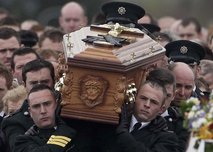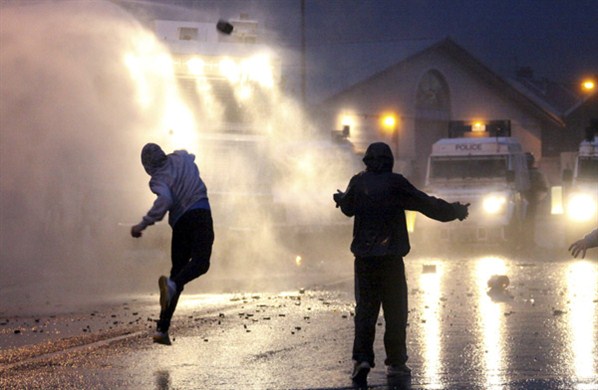Police in Northern Ireland have made three arrests in connection to the death of a Northern Ireland police officer last month.
To most of the Americans I have spoken with about Northern Ireland, the situation in Belfast is an example for the world to follow in terms of resolving conflict.
Some of these Americans, and even wide audiences I have spoken with in Ciudad Juarez, Mexico, Havana, Cuba, and here at Harvard, consider the conflict in Northern Ireland to be not just dormant, but solved all together.
Unfortunately, sectarian violence is growing in the region. While rioting, segregated school systems, and political unrest are expected ten years out from peace treaties, Belfast, and its northern sister city, Derry, are scenes of serious signs that The Good Friday Agreement could be null and void.
I am no expert on this conflict. I lived in Belfast from 2005 until 2007, assembling and coaching integrated basketball teams, which proved very successful in forming lasting bonds between troubled youths from both communities. I also sat down with several high-ranking paramilitary leaders from the IRA, UDA, and UVF and tried my best to grasp what the future of Belfast might look like.
None of them said it would look like this:
March 2009: The Real IRA shoots and kills two British soldiers and a police officer.January 2010: A Catholic police officer is critically injured by an Irish Republican bomb.April 2011: Former Provisional IRA members booby trap a Catholic police officer's car, killing him instantly.
That's only scratching the surface. But the latest murder, that of 25-year-old police officer Ronan Kerr, has many scratching their heads in worry.
 PC Ronan Kerr's casket is carried by fellow officers. AP Photo.
PC Ronan Kerr's casket is carried by fellow officers. AP Photo.
To be clear, Belfast is a place I love; my heart is there and always will be. A small minority of people truly are ruining the reputation that that great city -- and the region -- deserves. But where is their power coming from? What is the true source of their motivation? Is it political? Or are these actors merely youth being exploited to carry out violent crimes in the name of a once withering ideology?
Recently I sat down with Andrew Sanders, author of the book, Inside the IRA: Dissident Republicans and the War for Legitimacy. He is also a PhD from Queen's University in Belfast and Professor of History at Seattle University.
Sanders specializes in several issues relating to the conflict in Northern Ireland, including the division of Irish republicanism, as well as intelligence cooperation between security forces in the region. I sought to get the bottom of the issue, to the truth behind Belfast's inching backward toward its darkest times.
Sanders made it clear from the start that Irish Republicans were seeking to curb the region's movement toward a lasting peace. "In killing and targeting [Catholic police officers], Irish republicans who are opposed to this process of normalization are seeking to undermine the entire state of Northern Ireland."
But why would these new splinter groups, like the Real IRA and the Continuity IRA, who are Irish Republicans and who are Catholic, target their own people?
"They believe that the Provisional IRA sold out the true republican cause of a united Irish republic of all 32 counties on the island, not the 6 county Northern Ireland and 26 county Republic of Ireland which we have today," Sanders said.
"Their logic behind killing Catholic police officers is that if they can undermine the normalization process and force Catholic people to oppose the very existence of the police, it will then follow that the state is illegitimate and a process of unification can begin," he added.
I asked him if this was a widely supported movement; are everyday people backing these acts of violence? Is the IRA we all remember showing their support?
"Not really," Sanders told me. "A few disgruntled members of the Provisional IRA did join the groups during their early days, but the vast majority of volunteers, along with the overwhelming majority of Northern Irish citizens, are simply tired of the violence."
This didn't surprise me. All of the former IRA members I met with spoke of these new flare ups as the wrong way forward. So who, then, is backing the flare ups?
"Well, there are a variety of people. Some people still, despite all the bloodshed, do believe that armed struggle is the way to get a united Ireland," Sanders admitted.
We've heard for years that the IRA is under intense surveillance, and that their weapons have been destroyed. So, how are they getting these materials? I understand Muammar Gaddafi may be involved?
"Yes, the bomb which claimed the life of Ronan Kerr was manufactured using Libyan-sourced semtex. Gadaffi has been linked to international terrorist groups since his coup d'etat in 1969. He sent semtex to the IRA in an effort to punish the UK after American forces bombed Tripoli and Benghazi in 1986."
I asked him about youth; is this an example of violence being passed down to new generations? His answer revealed a grim truth.
"There is a worrying trend of young people becoming involved in these organizations. For young people who grew up in republican areas during the 1970s and even the 1980s, the IRA gave their lives a sense of purpose. They could be seen to be playing their part in the struggle for Irish freedom. Today, the struggle has moved to the political arena, but this is less attractive for thrill-seeking and disgruntled youths who put their energies into organizations which seek to continue the violence."
 Rioters fight off police during a riot in Belfast. AP Photo.
Rioters fight off police during a riot in Belfast. AP Photo.
He said that during riots, Republicans have been known for using young people -- even children -- as shields, in the hopes for rallying support for their cause.
"As morally corrupt as it seems, the death of a child would actually further the agenda of the so-called "dissidents" more than the murder of police officers or British soldiers could. Nothing would bring emotionally-driven supporters towards the Real IRA like the Police Services of Northern Ireland killing of a child."
So what is it about the political climate there, or the tactics behind the recruitment, that fuels this fire?
"Some of these young people have become politicized," Sanders said, "convinced that they are second class citizens, subordinate to the Protestant people of a Protestant state."
How do the people of Belfast, the large majority who want peace and who work for it everyday, stop this growing force of hatred and violence?
"The first step is to keep young people away from such activities; the second step is to build cross-community trust," he said. Although Sanders didn't mean for this to sound easy, I must add that is one of the hardest things that I have ever attempted. As in any other place in the world, the most violent areas of Belfast lack resources. Community groups, even the boldest of them, which are sometimes run by reformed paramilitary groups, do not get the attention they deserve.
"Education is also crucially important, both in helping these kids come to terms with what has happened in the past and in providing them with the tools for their futures." Sanders raises another pressing issue here; over 90 percent of the school systems in Northern Ireland are segregated. From my personal view -- having brought small groups of Catholics into rough, Protestant-only schools, and vice versa -- it's very similar to Alabama in 1950. It is even perhaps less tenable.
The professor finished our interview with a harrowing but hopeful salute.
"It could be argued that the murder of officer Kerr should force widespread recognition that the dissident republicans represent a serious threat and deserve to be considered as such. Although the groups still do not maintain a threat comparable to that of the Provisional IRA, the continuing cycle of death and devastation suggest something else. Particularly crucial is the fact that the considerable work towards reconciliation and the establishment of a lasting peace in Northern Ireland should not be allowed to go to waste."
